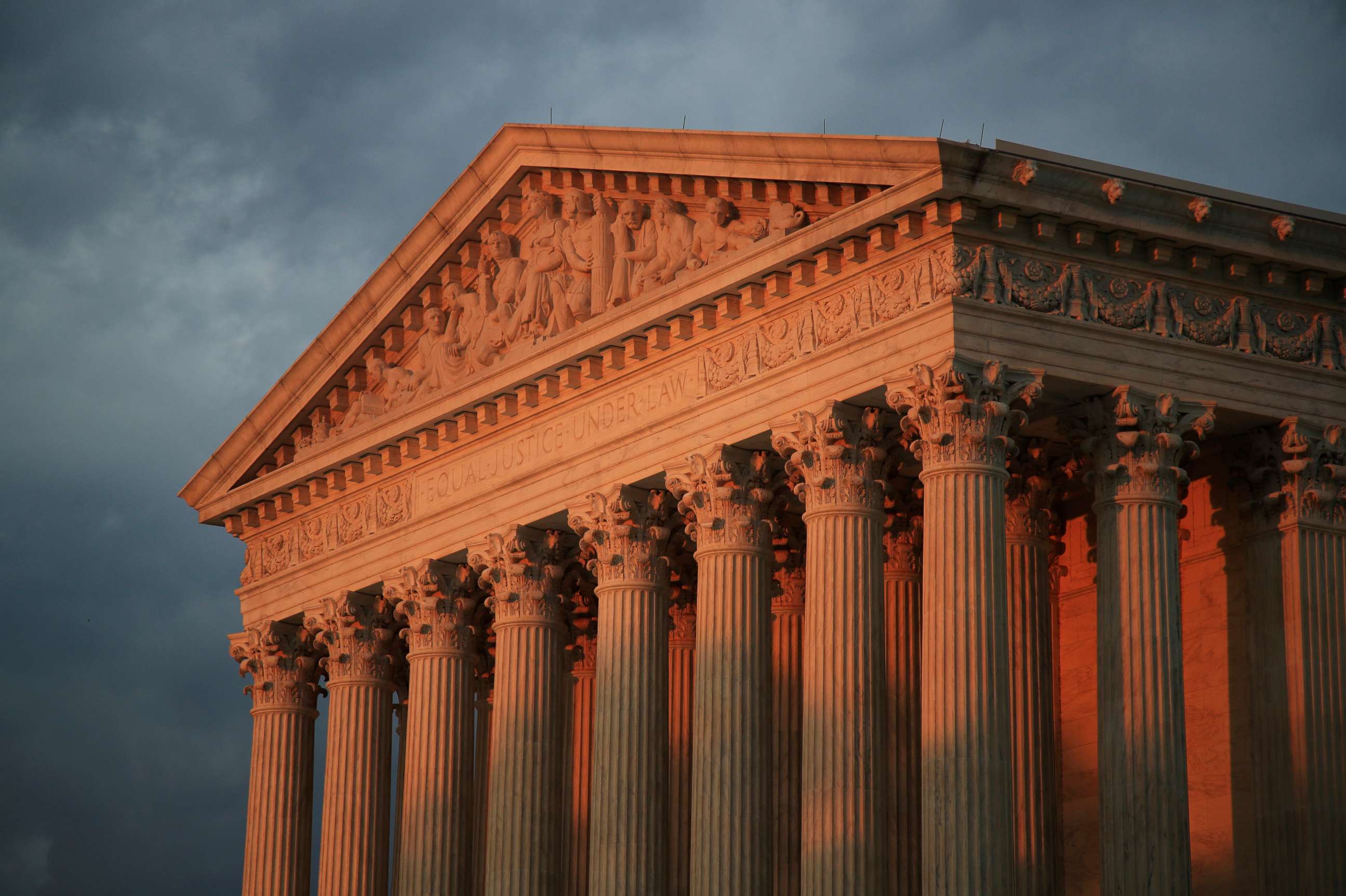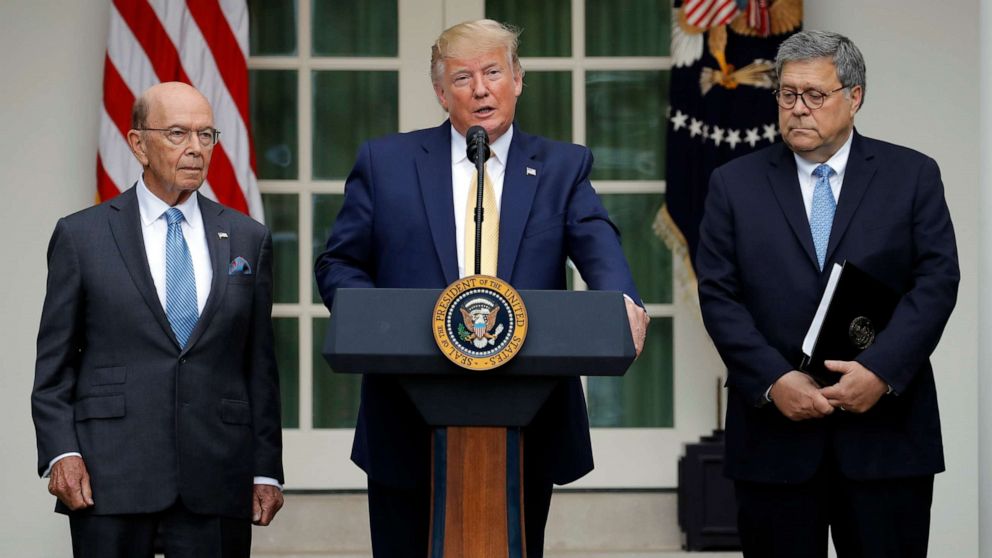Trump announces end of fight to add citizenship question to census
President Donald Trump announced Thursday he is backing down from his effort to include a citizenship question on the 2020 census, and will instead take executive action that instructs the Commerce Department to obtain an estimate of U.S. citizenship through other means.
"I am hereby ordering every department and agency in the federal government to provide the Department of Commerce with all requested records regarding the number of citizens and noncitizens in our country," Trump said in a Rose Garden announcement on Thursday afternoon. "They must furnish all legally accessible records in their possession immediately. We will utilize these vast federal databases to gain a full, complete, and accurate count of the noncitizen population."
Attorney General William Barr later took the podium at the event to congratulate the president on the executive order, and indicated that it marks the end of the three separate ongoing court cases the administration is fighting in Maryland, California and New York over the administration's efforts to add the question to the census.
"There is simply no way to litigate these issues and obtain relief from the current injunctions in time to implement any new decision without jeopardizing our ability to carry out the census," Barr said, after insisting that he believed the government's effort would have inevitably survived a legal review if brought back before the Supreme Court.
But Barr also suggested, near the close of his remarks, that the administration would explore ways to potentially use the information collected from agencies to advise the congressional redistricting process, a move that would almost certainly generate a legal challenge from the same groups that brought lawsuits over the citizenship question.
"There is a current dispute over whether illegal aliens can be included for apportionment purposes," Barr said. "Depending on the resolution of that dispute, this data may possibly prove relevant."
The announcement brings to a close weeks of escalating confusion within the government over his demands that the controversial question be included in the census despite a Supreme Court order that had blocked the move.
Director of the ACLU's Voting Rights Project Dale Ho, who argued the census case before the Supreme Court, celebrated the announcement in a statement Thursday evening.
"Trump's attempt to weaponize the census ends not with a bang but a whimper," Ho said. "He lost in the Supreme Court, which saw through his lie about needing the question for the Voting Rights Act. It is clear he simply wanted to sow fear in immigrant communities and turbocharge Republican gerrymandering efforts by diluting the political influence of Latino communities."
As recently as Thursday morning, administration officials had been repeatedly suggested the president would take executive action calling for the question be added to the census. It was not immediately clear when and why the final decision was made not to move forward with that plan.

The announcement follows the government's acknowledgement in court last week that census forms continued to be printed without the question, in compliance with the Supreme Court's order last month.
In a majority opinion, Chief Justice John Roberts wrote that the administration's previous stated reasoning that it wanted the question added to better enforce the Voting Rights Act, "seems to have been contrived." However, Roberts also left open the possibility that the question could still be added if the administration presented a rationale that was sufficient.
New York Attorney General Letitia James, who's federal case against the citizenship question being added to the census ultimately led to the Supreme Court's decision, said she hoped "that this action will at long last allow us to put this national nightmare behind us."
“Reason has finally prevailed, and President Trump will no longer pursue a citizenship question on the 2020 decennial census. After more than 800 days of attempting to break with its own past practice, the federal government will proceed in the manner as their own Census Bureau had recommended from the beginning," James said in a statement.
Following the Supreme Court decision, the Justice and Commerce Departments announced last week that they were dropping any renewed effort to add the citizenship question.
But they reversed course after Trump tweeted that his administration was "absolutely moving forward" with efforts to include the question, sending DOJ lawyers scrambling to work up a new strategy that they could argue in the ongoing New York, Maryland and California cases.
The Justice Department then made a surprise announcement Sunday evening that it planned to completely replace its legal teams arguing those cases, raising speculation that some of the attorneys involved felt uncomfortable with the administration's path forward.
In an interview with the Associated Press earlier this week, Barr expressed confidence the administration had a legal path to still add the question, and disputed that the swap was a result of any internal objections expressed by the previous legal team.
But in two cases the attempted switch has hit a major roadblock.
Federal judges in both New York and Maryland have denied the government's attempt to withdraw the previous attorneys, both saying the government has not provided enough information on how a transition between the teams wouldn't serve to disrupt ongoing legal proceedings.
Immigration and civil rights groups opposing the administration's efforts have argued that including a citizenship question on the census could reduce response rates in immigrant communities, resulting in federal funding cuts to areas with high minority populations and congressional districts being drawn in a fashion that would politically advantage Republicans.
A Census Bureau report released just last month estimated that adding the question was likely to reduce responses in households with at least one non-citizen by at least 8%.
Officials from both the Justice and Commerce departments had previously argued repeatedly in court that the legal issues surrounding the census had to be resolved by the end of June to begin the printing process so forms could be ready for mailing by March.




